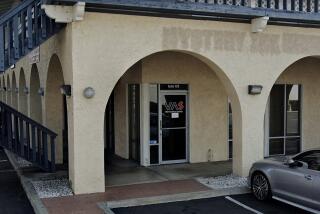State of the Art Co-Founder Sues Firm : Courts: Charles G. Milden alleges Irvine software company defrauded him and then covered it up with legal actions, resulting in bankruptcy proceedings and financial setbacks for him.
- Share via
IRVINE — The co-founder of the Orange County software firm that contends it developed the popular Quicken personal finance program has filed a racketeering and fraud suit against the company and numerous individuals, including several attorneys who were involved in his recent bankruptcy.
In the suit, filed Friday in U.S. District Court in Los Angeles, Charles G. Milden accuses State of the Art Inc. in Irvine--the company he founded in 1981--of defrauding him in a stock repurchase deal after he was fired as company president in 1985. The suit alleges a series of events aimed at covering up the purported fraud.
Among them:
* A $6-million suit against Milden by State of the Art that forced him into bankruptcy in 1992. Among those named as defendants in the suit are State of the Art’s current president, David W. Hanna, and its chief of research and development, George Riviere. Riviere was the best man at Milden’s wedding.
* A conspiracy by the company and a private investigator that resulted in Milden’s Chapter 11 bankruptcy reorganization being converted to a Chapter 7 liquidation action that placed his assets under the control of a court-appointed trustee.
* An unexplained decision by the first trustee to settle Milden’s countersuit against State of the Art for $125,000 when he and his personal attorneys believed he could win $1 million or more if the case had gone to court.
* Ongoing efforts by several trustees and bankruptcy attorneys to keep Milden in Chapter 7 instead of allowing him to participate in a reorganization plan that would allow him to regain control of his assets.
The bankruptcy trustees and attorneys named as defendants in the suit are included in both the racketeering and conspiracy sections; their actions to place Milden in Chapter 7 and to keep him there allegedly are part of the larger scheme to keep him from pressing his claims against the company, according to James H. Fosbinder, Milden’s attorney.
Company officials could not be reached for comment Friday.
Milden, a software development engineer, teamed up with Riviere to form State of the Art to develop accounting software. One of their early efforts, which the company sold to Intuit in Palo Alto in 1987, became the basis for the Quicken personal finance management program. Intuit acknowledges State of the Art’s early efforts but disputes the company’s contention that it was the actual developer of the program.
Intuit has since sold almost 4 million copies of the Quicken program, making it the most popular software of its type in the world.
Milden, who became a millionaire in 1979 when he and Riviere sold their first software company to MAI Systems Inc. of Tustin, wound up in bankruptcy court in 1992 because of the costs of defending himself against a suit brought by State of the Art in 1990. That suit, alleging that Milden had stolen company trade secrets, was filed almost five years after he was fired as company president in a dispute with investors and directors over management style.
Milden’s financial downfall began in 1990, when he sold 90,300 shares of State of the Art stock to the company under a repurchase agreement. The company valued the shares at 80 cents each and paid Milden $72,200. Within several months, Milden said in the suit he filed in 1991, the company offered its shares in a public sale and priced them at $9 each.
State of the Art filed its suit against Milden after he complained that he had been defrauded in the stock repurchase, he said.
Milden said he filed his suit in retaliation and that the cost of defending himself against the State of the Art suit while pressing his own case forced him to file a Chapter 11 petition in bankruptcy court, seeking protection from creditors’ claims while he reorganized his finances.
But Milden’s Chapter 11 case, which allowed him to maintain control of his finances and spending, was transformed into a Chapter 7 case when he failed to persuade the bankruptcy trustee reviewing his case that he had filed an adequate plan of reorganization.
A Chapter 7 action gives control of Milden’s personal estate to a trustee and the first trustee to get the case worked out a settlement with State of the Art in which the company agreed to pay $125,000 to the Milden estate after Milden was done appealing various decisions that have gone against him in recent years.
More to Read
Inside the business of entertainment
The Wide Shot brings you news, analysis and insights on everything from streaming wars to production — and what it all means for the future.
You may occasionally receive promotional content from the Los Angeles Times.










